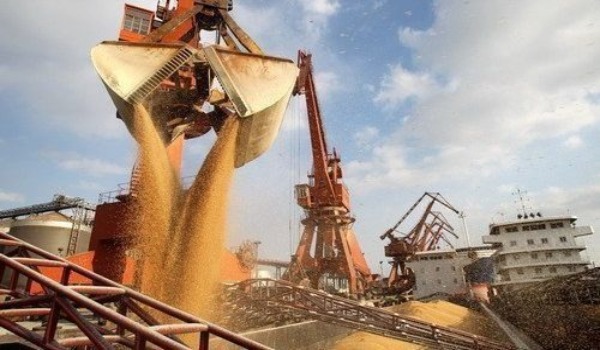Russia-Ukraine grain deal: AU, US hails agreement for passage of agro-goods via Black Sea
The invasion of Ukraine has threatened the lives of people far from the front lines. They have seen Russian forces block millions of tons of grain from leaving ports on the Black Sea.
An initiative brokered by the UN Secretary-General Antonio Guterres, Turkish President Recep Tayyip Erdogan in Ankara Friday on the safe transportation of grains from Ukrainian Black Sea ports have freed up shipments of foodstuffs.
Guterres said, “Today, there is a beacon on the Black Sea. A beacon of hope, a beacon of possibility. A beacon of relief in a world that needs it more than ever.”
Guterres says the agreement inked will allow ships to come and go from three key ports, including Odesa the largest and most important port on the Black Sea is considered integral for staging these shipments. An agency will be set up in Istanbul to help implement the deal.
Russian Foreign Minister Sergey Lavrov said, “Given the significant share of Russian and Ukrainian agricultural products on global markets, ensuring their uninterrupted export meets the urgent tasks of maintaining food security, especially for developing and least-developed countries.”
Ukrainian President Volodymyr Zelenskyy is also optimistic and sees the agreement as another sign that his country can withstand the war. He said the deal offers a chance to reduce the severity of the food crisis noting that about 20 million tons of grain will be exported, worth 10 billion dollars.
But he warned against Russian provocation and attempts to discredit Ukrainian and international efforts.
The deal though temporary subject to review in 120 days by the two sides have agreed, during that time, to stop attacks against port facilities and cargo ships.
Meanwhile missiles struck a key Ukrainian port Saturday, just one day after Kyiv and Moscow signed a breakthrough deal to unblock shipments of grain.
Pointing the finger at Russia, Ukraine’s air force chief said grain stores at the port had been deliberately targetted.
“The port of Odesa was shelled, especially where the shipping processes [of grain] were taking place. We shot down two missiles, and two more missiles hit the port infrastructure where, obviously, there is grain,” Ukrainian airforce spokesman Yuri Ignat said.
Ukraine accused Russian President Vladimir Putin of “spitting in the face” of the UN and Turkey by bombing Odesa port, saying Moscow would bear “full responsibility” if the agreement failed.
By firing missiles at Odesa, Putin “spit in the face of UN Secretary-General Antonio Guterres and Turkish President Recep Erdogan, who have made enormous efforts to reach this agreement”, said Ukraine’s Foreign Ministry spokesman Oleg Nikolenko.
The strike has been “unequivocally condemned” by the UN, alongside EU officials, such as EU Commission Vice President Josep Borrell Fontelles, who said it “demonstrates Russia’s total disregard for international law.”
Oleksiy Goncharenko, Odesa MP, said early Saturday morning that four “Kalibr missiles” were fired at the southern port.
US Ambassador to Kyiv Bridget Brink called the strike “outrageous.” She said on Twitter that Russia hit the port city less than 24 hours after signing the agreement. She accused the Kremlin of continuing to weaponize food.
US Secretary of State Antony Blinken has welcomed a deal to resume exports of Ukrainian agricultural goods through the Black Sea, calling it “a positive step towards addressing the far-reaching impacts of Russia’s war.”
In a statement on Friday, he said the international community must hold Russia accountable for the deal, ensuring Ukrainian agricultural goods reach world markets.
Blinken noted that Russia has weaponized food since the beginning of the crisis.
He urged Russia to immediately end its invasion of Ukraine. He said, “Global food security will remain at risk for as long as Russia continues its unjustified and brutal aggression against Ukraine.”
The African Union on Saturday hailed a landmark deal between Ukraine and Russia that will allow Kyiv to resume exports of grain through the Black Sea and relieve a global food crisis.
Ukraine’s farms are a major source of grain for the world market, in particular in the Middle East and Africa, where food supplies are critically tight.
Cereal prices in the world’s poorest continent have surged because of the slump in exports, sharpening the impact of conflict and climate change and sparking fears of social unrest.
“The Chairperson of the African Union Commission Moussa Faki Mahamat welcomes the signing by Russia and Ukraine of agreements,” a statement said, praising Senegalese leader and AU chair Macky Sall “for having called for the urgent need for the resumption of cereals from Ukraine and Russia to global markets as made to President Vladimir Putin during a joint AU mission to Sochi” in early June.
Ukraine and Russia are two of the world’s largest grain producers.
But Ukrainian mines laid across the Black Sea to avert an amphibious assault, as well as Russian warships, have blocked exports from Ukraine, leaving up to 25 million tonnes of wheat and other grain in danger of rotting in ports and silos.
Sall thanked Turkish President Recep Tayyip Erdogan, who oversaw the signing ceremony in Istanbul on Friday, as well as presidents Putin and Volodymyr Zelensky of Ukraine.
“This was the objective of the mission I led in Sochi on June 3,” Sall tweeted.
The International Rescue Committee, which helps people affected by humanitarian crises, also welcomed the accord, saying countries in East Africa relied “on Russia and Ukraine for over 90 percent of their wheat imports”.
“The lifting of these blockades will go some way in easing the extreme hunger that over 18 million people in East Africa are facing, with three million already facing catastrophic hunger conditions,” Shashwat Saraf, IRC’s East Africa emergency director, said.




